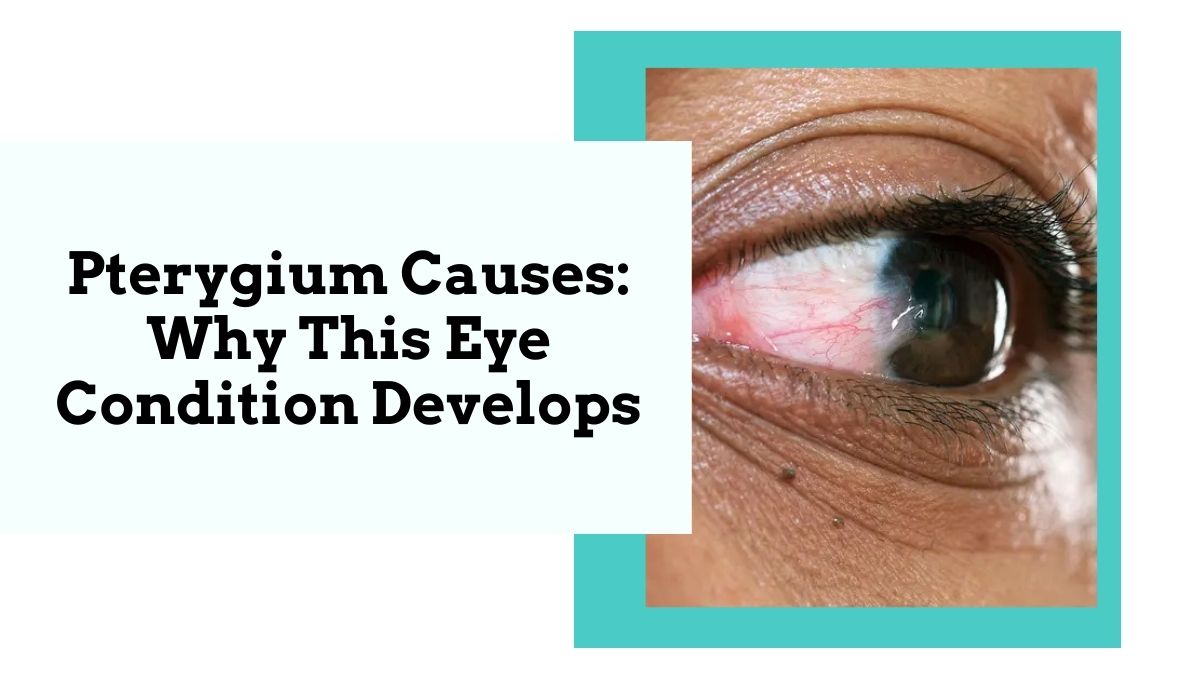Pterygium Causes: Why This Eye Condition Develops

Our eyes are delicate organs that deserve care and attention. However, due to lifestyle habits, environmental exposure, and genetics, many people develop conditions that affect their eye health. One such condition is pterygium, also known as “surfer’s eye.” It is a non-cancerous growth on the white part of the eye that can extend toward the cornea. While it may seem harmless initially, in advanced cases it can blur vision or cause discomfort. Understanding what causes pterygium is the first step to preventing and managing it effectively.
In this blog, we will explore the causes of pterygium, its risk factors, and why consulting the best eye surgeon in Delhi can make a big difference in treatment outcomes.
What is Pterygium?
A pterygium is a fleshy, wedge-shaped growth of tissue that usually starts on the inner corner of the eye and may spread across the cornea. It can occur in one or both eyes. Although it is not cancerous, untreated cases may interfere with vision or cause cosmetic concerns.
Causes of Pterygium
1. Prolonged UV Exposure
One of the leading causes of pterygium is constant exposure to ultraviolet (UV) rays from the sun. People who spend a lot of time outdoors—such as farmers, construction workers, or sports players—are more prone to developing this condition.
2. Dry and Dusty Environments
Dry climates, windy conditions, and dust particles can irritate the eyes, leading to repeated inflammation. Over time, this irritation may result in pterygium.
3. Genetic Predisposition
Family history plays a role too. If pterygium runs in your family, you may have a higher chance of developing it compared to others.
4. Chronic Eye Irritation
People who frequently experience eye redness, dryness, or allergic reactions are more at risk. Continuous irritation accelerates abnormal tissue growth on the eye’s surface.
5. Age and Lifestyle Factors
Although pterygium can occur at any age, it is more common in adults over 30. Smoking and lack of proper eye protection also increase the risk.
Symptoms to Watch Out For
While the condition may be mild in the beginning, you should be aware of signs such as:
- Persistent redness in the eye
- Feeling of something stuck in the eye (foreign body sensation)
- Blurred or distorted vision if the growth extends to the cornea
- Visible fleshy tissue on the white of the eye
If you notice these symptoms, visiting an experienced eye specialist doctor in Delhi at a trusted eye hospital in South Delhi is highly recommended.
Why You Shouldn’t Ignore Pterygium
Though pterygium starts as a minor eye issue, ignoring it can lead to:
- Progressive vision problems
- Permanent scarring on the cornea
- Increased recurrence if not treated properly
This is why consulting the best eye surgeon in Delhi is crucial for accurate diagnosis and tailored treatment.
Treatment Options for Pterygium
- Lifestyle Management: Wearing UV-protective sunglasses, using lubricating eye drops, and avoiding dusty areas can help in mild cases.
- Medical Treatment: Anti-inflammatory drops may be prescribed to reduce redness and swelling.
- Surgical Treatment: For advanced cases, surgical removal is the most effective option. An expert surgeon ensures minimal recurrence and faster recovery.
At a reputed eye clinic, you can undergo safe and advanced surgical procedures performed by specialists. Choosing the best eye surgeon in Delhi ensures that you receive personalized care and long-term relief.
Preventing Pterygium
While not every case can be prevented, you can significantly lower your risk by:
- Wearing sunglasses that block 100% UV rays
- Using protective eyewear in windy or dusty areas
- Keeping your eyes hydrated with lubricating drops
- Scheduling regular check-ups with an eye specialist
Conclusion
Pterygium is a common yet often misunderstood eye condition. Its causes range from UV exposure and dust to genetic factors and chronic irritation. Early attention and preventive care are essential to protect your vision. If you’re experiencing symptoms, don’t delay consulting the best eye surgeon in Delhi for guidance and treatment. With expert care available at a trusted eye hospital or a specialized eye clinic in South Delhi, you can safeguard your eyes and enjoy clear, healthy vision for years to come.

